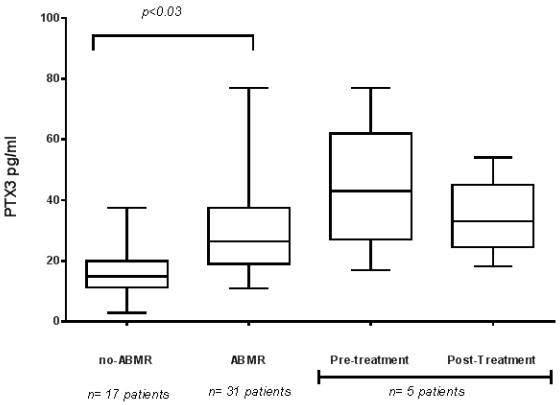Elevated Serum Penteraxin in Cardiac Allograft Antibody Mediated Rejection: From Cytokine Arrays to Patients with ABMR
1Baylor Research Institute, Dallas
2Medical University of South Carolina, Charleston
3University of Michigan, Ann Arbor, MI.
Meeting: 2018 American Transplant Congress
Abstract number: 171
Keywords: Heart transplant patients, HLA antibodies
Session Information
Session Name: Concurrent Session: The Guest That NEVER Leaves: Immunologic Challenges in Heart Transplantation
Session Type: Concurrent Session
Date: Sunday, June 3, 2018
Session Time: 4:30pm-6:00pm
 Presentation Time: 5:30pm-5:42pm
Presentation Time: 5:30pm-5:42pm
Location: Room 4C-3
Pentraxin 3 (PTX3) is soluble protein that has been implicated in in atherosclerosis, endothelial function, hypertension, myocardial infarction and angiogenesis (Fornai et al., 2016). We aimed to investigated alterations in protein expression following treatment of primary endothelial cells (HUVECs) and to evaluate the association between serum PTX3 and ABMR.
Methods: Protein expression in HUVECs was determined by protein microarrays. PTX3 levels in culture supernatants of HUVEC treated and untreated with HLA class I Ab was determined by ELISA. We also conducted an analysis of 48 heart transplant recipients transplanted in our centers between 2011-2016. The study included 42 sera collected from 31 patients who developed post-Tx class I DSA and biopsy proved ABMR. The control group included 32 sera from 17 patients with no DSA or ABMR until last follow up (median follow up 33 months, range 1 month-63 months). Patients in the study were 27 white, 17 African Americans and 4 others; 19 females and 29 males and age of 3 months – 52 years. Secreted PTX3 levels were determined in serum samples obtained from cardiac transplant recipients with HLA class I donor specific antibodies and biopsy proven ABMR using in-house developed ELISA assay.
Results: Endothelial cells treated with Class I HLA antibodies showed increased PTX3 protein levels using the membrane arrays. These results were further confirmed with ELISA. Higher serum PTX3 levels were observed in the samples obtained from ABMR patients (Mean 29.04±SD 7.2 pg/ml) compared to samples obtained from non-AMR 17 patients (Mean 15.87±SD 6.859), P value = 0.03, Figure 1. In addition, PTX3 levels were reduced in 3 out of 5 patients post AMR treatment. The Mean serum PTX3 levels pre-treatment was 44.0 ± 21.66 compared to 34.44±12.86 post-treatment.
Conclusion: Serum PTX3 may be a useful biomarker to diagnose ABMR in heart transplant recipients and possibly monitoring treatment. Further investigation of its role in ABMR is warranted.
CITATION INFORMATION: Moussa O., Kavarana M., Klingman L., Felius J., Hall S., Askar M. Elevated Serum Penteraxin in Cardiac Allograft Antibody Mediated Rejection: From Cytokine Arrays to Patients with ABMR Am J Transplant. 2017;17 (suppl 3).
To cite this abstract in AMA style:
Moussa O, Kavarana M, Klingman L, Felius J, Hall S, Askar M. Elevated Serum Penteraxin in Cardiac Allograft Antibody Mediated Rejection: From Cytokine Arrays to Patients with ABMR [abstract]. https://atcmeetingabstracts.com/abstract/elevated-serum-penteraxin-in-cardiac-allograft-antibody-mediated-rejection-from-cytokine-arrays-to-patients-with-abmr/. Accessed February 20, 2026.« Back to 2018 American Transplant Congress

